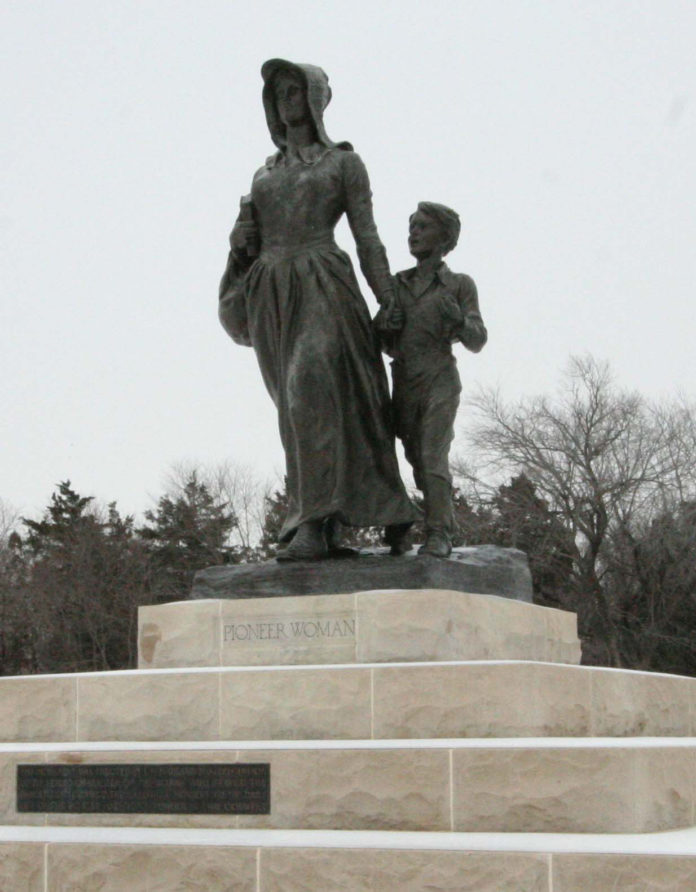BY DAVID PERRYMAN
 Gazing intently to the southwest with her chin held high, Oklahoma’s Pioneer Woman statute stands as a symbol of courage, faith and hope and is one of the most recognizable sculptures in the United States. The statue is properly named “Confidence.”
Gazing intently to the southwest with her chin held high, Oklahoma’s Pioneer Woman statute stands as a symbol of courage, faith and hope and is one of the most recognizable sculptures in the United States. The statue is properly named “Confidence.”
Portrayed is not a woman with worn or calloused features. She is a young mother like yours and mine whose eyes are fixed on the horizon seeking opportunity for her family. Her determination is not harsh, but she is steadfast in her resolution to lead her young son onward.
The firmness of her grip on Bible and son is balanced; however, her demeanor displays that she is aware of much more than simply arriving at a place where her steps will guide them that day. As only a Mother can, she envisions thousands of tomorrows and fully realizes that each singular step has the potential of affecting generations to come through her progeny.
She knows that it will not be easy. She knows that nothing worthwhile ever is. If she has not already faced the heartache of losing an infant child, it is likely that she will.
She and her husband may have already left parents in the east, often never to see them again. She knows that whatever hardship befalls them, the future of her family depends on her. She knows that husbands can fail, but mothers cannot. Her expression shows that she is up to the challenge.
This Mother’s Day, I am reminded why the Pioneer Woman statue means so much to me.
My great-great-great grandmother homesteaded in Iowa, leaving behind an infant child buried in Indiana. My great-great grandmother homesteaded in Kansas, leaving her parents and siblings in Iowa and losing two daughters at a young age. My great grandmother homesteaded in Caddo County, OK living among the Kiowa and leaving her parents in Kansas only to lose a son there.
My grandmother, until she passed, always wore a sun bonnet identical to the one worn by the Pioneer Woman. My mother also has an infant son buried over six decades ago on the windswept prairie of Caddo County.
We all have stories of the strong women in our families who protected us physically, led us morally, guided us spiritually and prepared us as best they could to raise grandchildren and their progeny.
Unfortunately, our society undermines much of our heritage. The value of women is discounted and marginalized. We see women abused and displaced. We may not be able to do much about society overnight, but we can work on long-term solutions by addressing the needs of displaced women.
Our churches do what they can and are often overwhelmed by the need. As line items on the state budget are addressed, it is important that adult education and parenting programs and mental health issues be properly funded. It is important that Temporary Aid To Needy Families be directed to help young mothers regain dignity and direction in their lives.
We must be ever diligent that tax revenue is not abused, but instead, used judiciously to provide stability so that mothers can go about the job of raising productive citizens.
It is easy to be negative and reject these needs until we are personally involved in the lives of those who have these needs. We have a duty to be there where “the rubber hits the road.”
I urge you to volunteer to help meet those needs and see for yourself the struggles faced by women in today’s world. Today, all young mothers have the same dreams for their children as our pioneer ancestors did. In pioneer days, the government program was free land and a public education. Today, they just need a hand up – not a handout.
This spring or summer, plan a trip to see “Confidence” in Ponca City, sculpted by English born artist Bryant Baker, and more importantly visit the Pioneer Woman Museum which showcases the history of women in Oklahoma and their influence on the development of the state and nation. It preserves the legacy of women from all races, creeds, and nationalities who have made significant contributions to the history of Oklahoma.
– David Perryman, a Chickasha Democrat, represents District 56 in the Oklahoma House of Representatives








